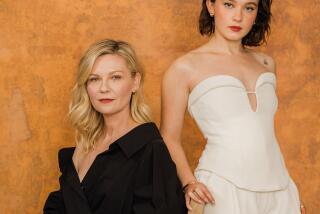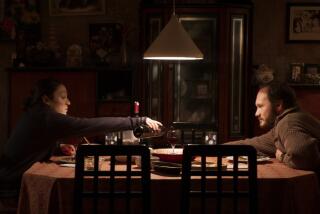Fatih Akin’s new thriller ‘In the Fade’ looks at neo-Nazis and a disturbing world of terror and hate
The new film by Turkish German director Fatih Akin veers onto a shattered street and ventures into a world of neo-Nazis, immigration, suspicion and disconcerting questions over whether a woman can find repose in vengeance after a terrorist bombing kills her husband and young son.
Akin is skilled in the collision of cultures and the intricacies of betrayal. His tense and devastating “In the Fade,” which opens Dec. 27 in Los Angeles, explores what binds and separates us at a time of Islamic radicalism and rising alt-right militants. The story’s protagonist Katja (Diane Kruger) wanders in the unsettled blurriness between moral quandary and searing loss in a tale that is at once psychological thriller and meditation on justice.
The German film is an evolving portrait of Katja as she seeks to avenge the deaths of her son and Kurdish husband at the hands of far-right extremists in Hamburg. The movie — a Golden Globe nominee and shortlisted for an Oscar for foreign language film — was inspired by a string of neo-Nazi murders. It conjures a Europe where millions of refugees and migrants from Muslim and African countries have roused right-wing populist parties and rattled politics from Denmark to Hungary.
“Neo-Nazi attacks in Germany have happened all my life,” said the 44-year-old Akin. “They started in the 1980s with skinheads. It always seemed like a personal attack on me, so I needed a catharsis. That’s why I did my film. But somehow this project of mine became relevant all over the world, including the U.S.
“This need for catharsis seemed to be everywhere. What happened with neo-Nazis marching in Charlottesville, Va., is not just a coincidence. This is a globalized world we’re living in. What happens in the U.S. is connected to what’s happening in Germany.”
On a recent evening, as wildfires flared west of his Hollywood hotel, Akin sipped a Long Island iced tea and spoke with sly humor and a rebel’s fervor. He wore tattoos and a ponytail and, as one who grew up between Turkish and German cultures, was at home in the contradictions, complexities and tricks of identity.
Kruger knows well the allure of Akin’s mischievousness: “We were shooting nights,” she said. “We had a couple of drinks after work because we were so exhausted and he said, ‘You know, I think we’re going to Cannes with this film.’ And I said, ‘Yeah, sure.’ And he made me a bet that if we did I’d have to get an anchor tattoo because that’s the symbol of his hometown of Hamburg.” Pause. “So I got an anchor tattoo” after winning best actress at the Cannes Film Festival.
Since his 2004 internationally acclaimed “Head On,” a love story of misfits set against alcohol, rage and cultural expectations, Akin has explored the strictures, joys and losses of “the other.” Many of them navigate segregated German neighborhoods while enduring the burden of tradition their parents brought from Turkey. His movies, including “The Edge of Heaven,” a tale of troubled, interconnected characters searching for glimmers of solace, mix stunning visceral rushes with moments of unexpected grace, as if strange, haunting flowers blooming from chaos.
“In the Fade” is Akin’s most Hollywood-like work. Told in three sections, the narrative follows Katja, played with fierce intensity and broken despair by Kruger, from the grief of a darkened house to the scoured light of a courtroom and to the coast of Greece, where she tracks the extremists who killed her family. She is drawn into a morality riddle that asks how one confronts evil and finds retribution when police and prosecutors have failed.
I don’t believe that vengeance is the answer. It would never stop. It’s like physics. It’s an energy that would go back and forth forever.
— Director Fatih Akin
“My film is a laboratory,” said Akin, referring to the choices Katja faces. “I don’t believe that vengeance is the answer. It would never stop. It’s like physics. It’s an energy that would go back and forth forever. It never disappears. It just turns into something else.” He added: “It’s OK in cinema for an individual not to be reasonable, but society expects you to be reasonable. There’s a clash.”
The son of Turkish Muslim parents who grew up in Hamburg, Akin, who has struggled with Islam and secularism, resisted assimilation like many Turks. He matured into an unapologetic, artistic progressive whose targets fell across political and religious spectra; he angered many Turks in 2014 with “The Cut,” his film about Armenian genocide in 1915, a taboo topic for the Turkish government.
“In the 1990s I considered myself a Turk, not a German,” he said. “I was not part of them and I didn’t want to be. Filmmaking made me a German. The state supported filmmaking and being an artist. I was not an artist at that time. I was not born an artist. I was born in the ghetto. But art has no nation, no nationality. It sees through things.”
“In the Fade” also reflects the changes — including integrated soccer teams — that have led to more tolerance across Germany, despite recent gains by the alt-right Alternative for Germany party. Katja and her husband, Nuri, were raising a son in a comfortable cross-cultural life before the bomb attack. “They had solved something that the generation before them hadn’t solved,” said the director. “But in extreme situations you see the ugliness of people.”
Akin has been “the subject of racism all his life,” Kruger said. “He was targeted by these [neo-Nazi] groups after his past films. This film is a mirror for what we’ve created for ourselves. The messes we are in. I hope this movie connects on an empathetic and emotional way so people can see what all this hate is creating.”
She added that working with Akin “was one the most rewarding collaborations I’ve experience with a director, maybe other than with Quentin Tarantino. Fatih is edgy. He’s a very demanding director, but warm. He’s a real filmmaker and a strong voice of his generation.”
Talking movies with Akin can slide from the French New Wave to the cinema of Egypt; nothing appears too obscure for him. He has a particular fondness — and perhaps was most influenced by — American film, especially the independent movement of the 1970s, in which Martin Scorsese, whom Akin calls “my filmographic father,” brought forceful realism and societal grit to the screen. His early films, including “Short Sharp Shock” and “Head On,” have echoes of Scorsese shot through Akin’s singular, idiosyncratic lens.
“I was always a bastard of the cinema from America,” Akin said. “I will try to work here, not to buy me a new kitchen. I could make more money in Germany. But I want a different experience. Experience is the most important thing. It helps you to maybe give the right answers to your kids when they ask you something.”
He mentioned directors, including Steven Soderbergh (“a filmmaker like David Bowie was a musician”); Sean Baker (“gives me a portrayal of America I don’t know but am very interested in”); and Orson Welles, whose work Akin turned to when fashioning the courtroom scene in “In the Fade.”
“I saw a lot of trial films, but the one that inspired me most was ‘The Trial’ by Welles from Kafka,” he said. “The sets are very linear.”
Akin reminisced on other films, then mentioned that years ago while researching for “The Cut,” he drove the back roads of America studying train routes of a century past. In the telling, he seemed a vagabond you might come across while hitchhiking, a raconteur enchanted by dirt roads that snake toward possibilities hidden in darkness. The story unfolded — his Long Island iced tea glass was empty — like one of his films: fury, tension, beauty and unanticipated resolution.
“I drove through America,” he said. “Florida. Alabama. Mississippi. South Dakota. North Dakota. I’ve seen it. I saved a couple of Americans from a flood. I was driving through Idaho through the rain and there was a very old couple in their 80s. They were stuck in the car in rising water. The phone network was down. It was the middle of nowhere. A friend and I carried these elderly people out.”
He smiled.
“Their daughter still writes to me,” he said. “She says, ‘God bless you, Jesus bless you.’”
See the most-read stories this hour »
Twitter: @JeffreyLAT
ALSO
With racial clashes rattling the country, the ‘Hamilton’ message of inclusion marches on
More to Read
Only good movies
Get the Indie Focus newsletter, Mark Olsen's weekly guide to the world of cinema.
You may occasionally receive promotional content from the Los Angeles Times.







